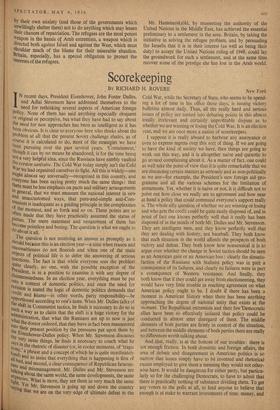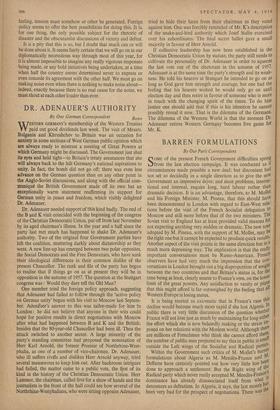Scorekeeping
BY RICHARD IN recent days, President Eisenhower, John Foster Dulles, and Adlai Stevenson have addressed themselves to the need for rethinking several aspects of American foreign Policy. None of them has said anything especially eloquent or original or perceptive, but what they have had to say about the need for new approaches has been as intelligent as it has been obvious. It is clear to everyone here who thinks about the Problem at all that the present Soviet challenge eludes, as of course it is calculated to do, most of the strategies we have been pursuing over the past several years. 'Containment,' though it can by no means be abandoned, is for the time being not a very helpful idea, since the Russians have nimbly vaulted the cordon sanitaire. The Cold War today simply isn't the Cold War we had organised ourselves to fight. All this is widely—one might almost say universally—recognised in this country, and everyone has been saying pretty much the same things : that there must be less emphasis on pacts and military arrangements in general, that we must measure the national interest in new and unaccustomed ways, that pure-and-simple anti-Com- niunism is inadequate as a guiding principle in the complexities of the moment, and so forth and so on. These points are so often made that they have practically assumed the status of ,Pieties. The mere statement and restatement of them has hect)file pointless and boring. The question is what we ought to do about it all The question is not receiving an answer as promptly as it should because this is an eleCtion year—a time when reason and reasonableness do not flourish and when one of the main objects of political life is to defer the answering of serious questions. The fact is that while everyone sees the problem r,titlire clearly, no one, with the possible exception of the president. is in a position to examine it with any degree of disinterestedness. In an election year, everything must be put unto a context of domestic politics, and once the need for revision is stated the logic of domestic politics demands that t'redit and blame—in other words, party responsibility—be `.1,PPortioned according to one's taste. When Mr. Dulles talks of the shift in Communist tactics, he finds it necessary to do so in such a way as to claim that the shift is a huge victory for the administration, that what the Russians are up to now is just ,vhat the doctor ordered, that they have in fact been manoeuvred io their present position by the pressures put upon them by t!n tihte Eisenhower-Dulles policy. When Mr. Stevenson discusses s, e very same things, he finds it necessary to couch what he irqs in the rhetoric of disaster (or, in cooler moments, of 'tragic 1:11.,Y.' a phrase and a conceptof which he is quite inordinately all and to insist that everything thdt is happening is first of 41t oad, and second, a clear consequence of Republican fatuous- ,:isis. and mismanagement. Mr. Dulles and Mr. Stevenson are u'gructng about the same world, the same developments, the same ligiteuc,Les. What is more, they see them in very much the same sa,,." let Mr. Stevenson is going up and down the country 'log that we are on the very edge of ultimate defeat in the Cold War, while the Secretary of State, who seems to be spend- ing a lot of time in his office these days, is issuing victory bulletins almost daily. Thus, all the really hard and serious issues of policy are turned into debating points in this almost totally irrelevant and certainly unprofitable dispute as to whether we are winning or losing the Cold War. It is an election year, and we arc once more a nation of scorekeepers.
I suppose it is really absurd to harbour any annoyance or even to express regrets over this sort of thing. If we are going to have the kind of society we have, then things are going to work out this way, and it is altogether naive and quixotic to go around complaining about it. As a matter of fact, one could as well take the point of view that it is quite remarkable that we are discussing certain matters as seriously and as non-politically as we are—for example. the President's new foreign aid pro- gramme and all the various schemes for the limitation of armaments. Yet, whether it is naive or not, it is difficult not to point out how close we really are to agreement and how near at hand a policy that could command everyone's support really is. The whole silly question of whether we are winning or losing and who gets the credit could be quite easily disposed of, and in point of fact one knows perfectly well that it really has been disposed of in the minds of both Mr. Dulles and Mr. Stevenson. They are intelligent men, and they know perfectly well .that they are dealing with history, not baseball. They both know that each Situation in the world affords the prospects of both victory and defeat. They both know how nonsensical it is to argue over whether the change in Soviet tactics should be seen as an American gain or an American loss : clearly the dissatis- faction of the Russians with Stalinist policy was in part a consequence of its failures, and clearly its failures were in part a consequence of Western resistance. And finally, they both know that if they could get away from electioneering, they would have very little trouble in reaching agreement on what American policy ought to be. I doubt if there has been a moment in American history when there has been anything approaching the degree of national unity that exists at the moment. The Republican extremists and their few 'Democratic allies have been so effectively isolated that policy could be conducted in almost utter disregard of them. The middle elements of both parties are firmly in control of the situation, and between the middle elements of both parties there are really no differences worth talking about.
And that, really, is at the bottom of our troubles : there is not enough friction. In both domestic and foreign affairs, the area of debate and disagreement in American politics is so narrow that issues simply have to be invented and rhetorical excess employed to give them a meaning they would not other- wise have. It would be dangerous for either party, but particu- larly so for the challenging Democrats, to have to admit that there is practically nothing of substance dividing them. To get any voters to the polls at all, to lead anyone to believe that enough is at stake to warrant investments of time, money, and feeling, tension must somehow or other be generated. Foreign policy seems to offer the best possibilities for doing this. It is, for one thing, the only possible subject for the rhetoric of disaster and the obscurantist discussions of victory and defeat.
It is a pity that this is so, but I doubt that much can or will be done about it. It seems fairly certain that we will go on in our diplomatically necessitous way through most of this year, for it is almost impossible to imagine any really vigorous responses being made, or any bold initiatives being undertaken, at a time when half the country seems determined never to express or even concede its agreement with the other half. We must go on making noise even when there is nothing to make noise about— indeed, exactly because there is no real cause for the noise, we must shout at each other louder than ever.











































 Previous page
Previous page